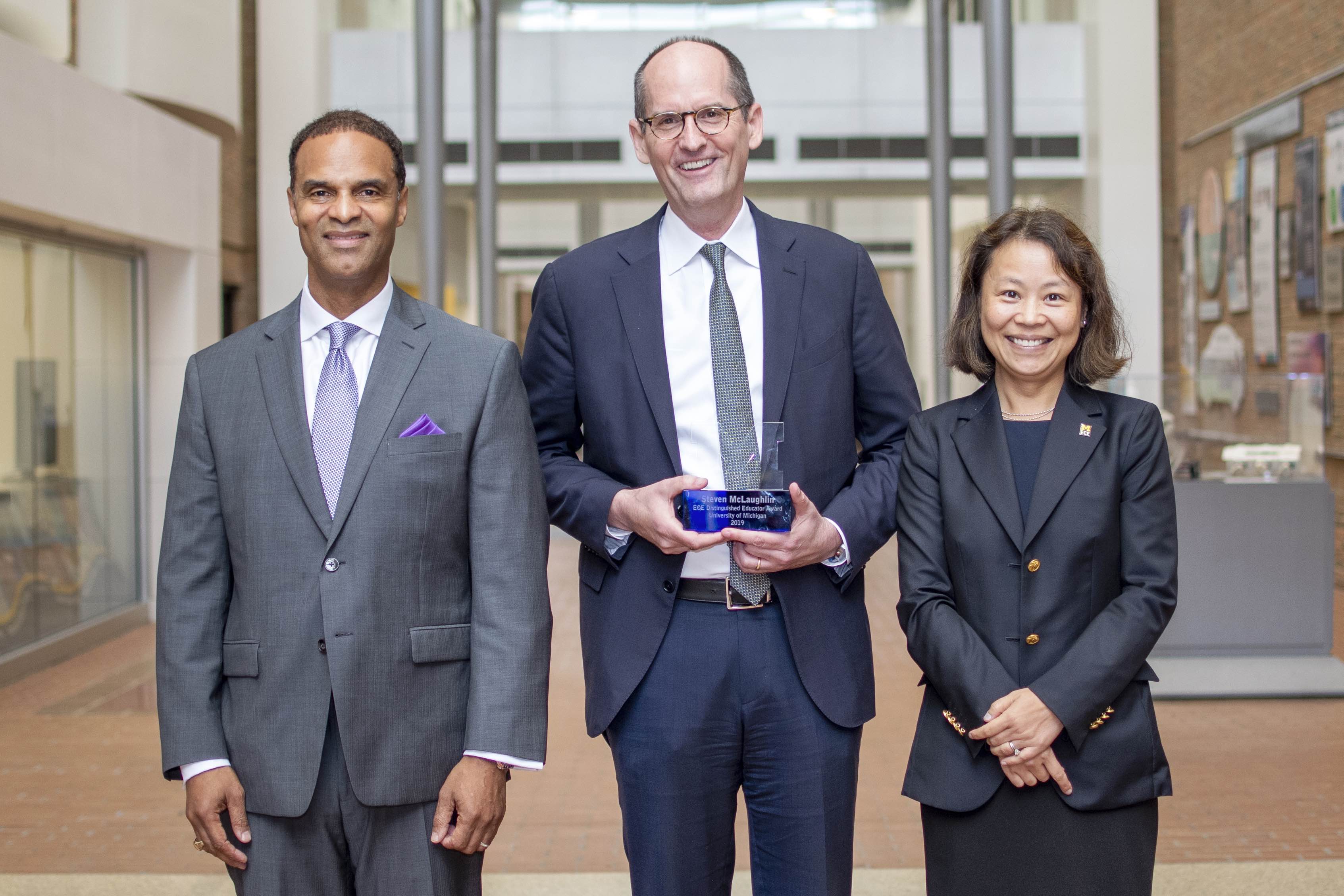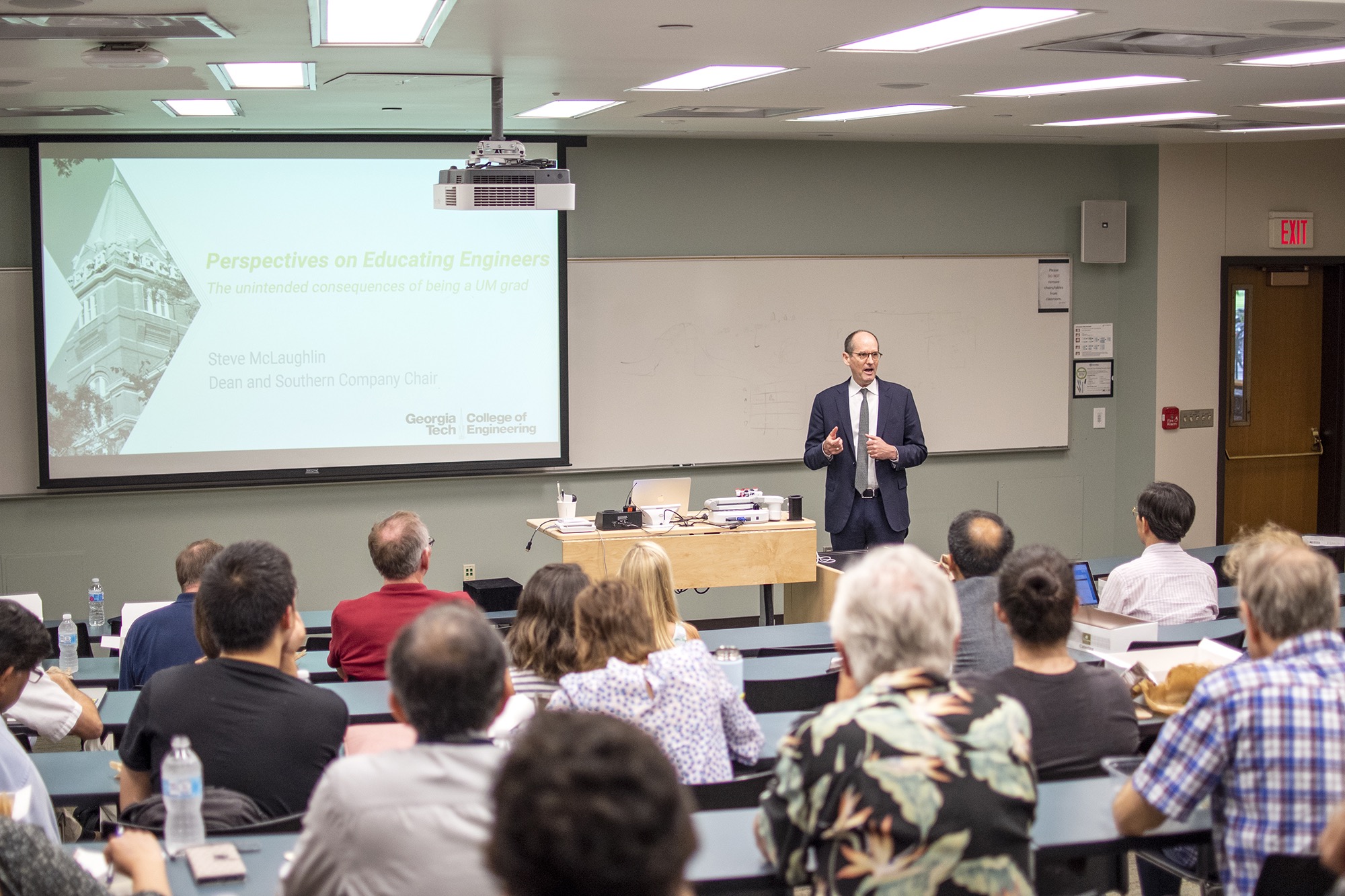Georgia Tech Dean of College of Engineering, Steve McLaughlin, wins 2019 ECE Distinguished Educator Award
McLaughlin spoke about how academic institutions can take better care of their students’ mental health while providing a fuller academic experience, as well as his love for U-M.

 Enlarge
Enlarge
Steve McLaughlin, the Dean of the College of Engineering at the Georgia Institute of Technology, was awarded this year’s ECE Distinguished Educator Award. The award is the highest recognition granted by ECE to its alumni in academia, and recipients are regarded as visionaries within the field and are celebrated for their exceptional work in educating the engineers of the future.
McLaughlin received his BS EE from Northwestern University, MSE from Princeton University, and PhD from the University of Michigan. His research interests are in the general area of communications and information theory. His research group has published than 250 papers, and he owns 36 U.S. patents. He is a past President of the IEEE Information Theory Society and is a Fellow of the IEEE. McLaughlin was also awarded the honor Chevalier de l’ordre national du Mérite,(Knight of the French National Order of Merit), the second highest civilian award given by Republic of France, for his leadership with the campus of Georgia-Tech Lorraine as well as Georgia Tech’s Office of International Initiatives. He was the first Georgia Tech recipient of the Presidential Early Career Award for Scientists and Engineers (PECASE), and he became Dean in 2017. Georgia Tech is the largest engineering college in the country with over 15,000 students.
McLaughlin came to campus on October 4thto accept the ECE Distinguished Educator Award. Alec Gallimore, the Robert J. Vlasic Dean of the College of Engineering at the University of Michigan, introduced him and noted that McLaughlin was his “first friend to have been knighted.”
McLaughlin spoke about the work needed to foster a supportive, positive environment for students.
“The subject of Steve’s presentation is extremely timely and very much front and center on our mind here at Michigan,” said Mingyan Liu, the Peter and Evelyn Fuss Chair of ECE. “It is an absolute delight to welcome back one of ECE’s proudest products.”
McLaughlin focused on two pillars of experience that improve the college culture:
- Addressing mental health concerns and recognizing current cultural challenges
- Fostering an environment that encourages extracurriculars such as student clubs, study abroad, and entrepreneurial experience
Nationwide, eating disorders, hostility, and alcohol abuse have been decreasing, but the overall stress index of students – including depression, generalized anxiety, social anxiety, academic stress, and attempted suicide – has continued to increase rapidly. McLaughlin said many of these issues can be attributed to the college culture, but he stressed that it is not about the rigor of the academic program.
“Students don’t come to Georgia Tech or Michigan not wanting to be challenged,” McLaughlin said. “It is not about decreasing rigor, but it is about better balancing and understanding and dealing with the challenges that our students are facing.
McLaughlin said one of the biggest sources of stress for students can be a lack of transparency in the classroom. If faculty don’t communicate well or have confusing policies, students feel as though their professors don’t care about their success. McLaughlin said faculty can improve this by making a point to regularly check-in one-on-one with students. Even a five-minute conversation can make them feel seen.
“Honor traditions don’t sacrifice rigor,” McLaughlin said. “We can equip faculty to be a little more human and crack open the door to real conversation.”
McLaughlin said another common cultural element is that students often bond over despair. A culture of “misery loves company” can be damaging to mental health, so it is important to foster a culture where students aren’t expected to be unhappy to be hard-working. A challenging environment does not have to mean a miserable environment.

 Enlarge
Enlarge
According to McLaughlin, one of the best ways to foster a positive cultural environment is to ensure students have the freedom and the opportunity to explore experiences outside of the classroom. Global experience, study abroad, entrepreneurship, internship, volunteering in the community, student organizations, fraternities, etc. – opportunities McLaughlin calls the “Student Plus Experience” – are places where students get experience in leadership and make lifelong memories that can define their college experience.
“Almost all the value that students and alumni talk about come from the Plus Experience,” McLaughlin said.
Not only does the Student Plus Experience help foster a happier, more positive environment, but McLaughlin said it’s where students actually gain the skills and education most important for their growth.
“The values that many of our students get from these Plus Experiences are the values that we’re really seeking,” McLaughlin said. “These are the places where students really gain the appreciation for diversity and inclusion. These are the places where they learn about community health and well-being, resilience, and adapting to the unbelievable complexities that they’re facing.”
One of the ways McLaughlin has helped encourage the Student Plus Experience was to co-found CREATE-X in 2014. CREATE-X is a campus-wide effort to instill entrepreneurial confidence in students and help them launch companies. In its first five years, the program successfully launched 160 student-led companies and engaged 3000+ Georgia Tech students in the principles and practice of evidence-based entrepreneurship. In addition, McLaughlin said the experience often unlocked the ambition, ideas, energy, and occasionally purpose of education for a student.
Another way McLaughlin champions the Student Plus Experience is through the continued support and promotion of study abroad programs. 55% of Georgia Tech’s engineering student body engage in an international experience. The six-year graduation rate at Georgia Tech for those who study abroad is 96.7% whereas the rate for those who don’t is 76.1%.
McLaughlin, who spent three years teaching at Georgia Tech’s campus in France, said the experience was incredibly impactful for both his professional and personal life, and such experiences are equally remarkable for students.
“In a state like Georgia, many of our first-generation students come from rural communities and have never even left the state,” McLaughlin said. “These international programs are the first kinds of experiences of travel for the students, and they’re absolutely transformational for them.”
Finally, McLaughlin reflected on his time as a student at Michigan.
“I certainly went to every single home game in the four years that I was here and about 75% of the away games,” McLaughlin said. “There’s a culture at Michigan that’s really infectious and that keeps people around. I learned to never be afraid to think too big. I can’t tell you how really overwhelming it is to be here, to receive this award, and to be back at a place that I truly love.”